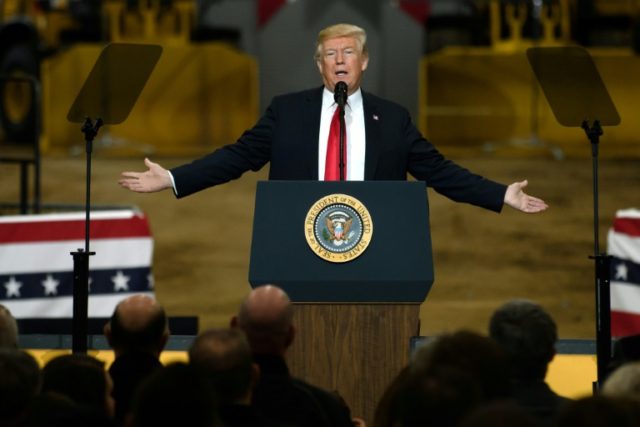President Donald Trump appeared to have caught the State Department and Pentagon by surprise when he teased the imminent withdrawal of U.S. troops from Syria on Thursday.
Few would dispute the president’s claims of tremendous progress against the Islamic State since his inauguration, but the Islamic State (ISIS) has not been completely destroyed, and the United States has other security concerns in the war-torn country.
“By the way, we’re knocking the hell out of ISIS,” Trump said at an event in Ohio on Thursday. “We’re coming out of Syria, like, very soon. Let the other people take care of it now. Very soon we’re coming out. We are going to have 100 percent of the caliphate, as they call it, sometimes referred to as land, taking it all back, quickly, quickly. But we are going to be coming out of there real soon.”
“I do not know. I do not know. I would have to refer you back to the White House,” State Department spokeswoman Heather Nauert said when asked if there was a timetable in place for U.S. withdrawal from Syria.
“Important work remains to guarantee the lasting defeat of these violent extremists. Our commitment to win must outlast the so-called physical caliphate, and the warped ideas that guide the calculated cruelty of ISIS,” the Pentagon said in a statement on Thursday shortly before President Trump’s remarks on withdrawing from Syria.
Trump followed up on Friday by ordering the State Department to suspend over $200 million allocated for recovery efforts in Syria as part of an overall reassessment of America’s objectives in the country. Senior administration officials told Reuters on Friday that the president has informed his advisers he wants “an early exit of U.S. troops from Syria.”
The president’s remarks in Ohio were not the first time he appeared to contradict the State Department’s position on Syria. Former Secretary of State Rex Tillerson maintained that, in addition to defeating the Islamic State, the United States needed to rein in other terrorist groups like al-Qaeda, neutralize Iranian influence in the region, deal with Syria’s weapons of mass destruction, and stabilize the country so that refugees could safely return. Tillerson committed the Syrian aid money Trump suspended on Friday in February at a meeting of the coalition against the Islamic State.
“We’re there for one reason: to get ISIS and get rid of ISIS and to go home,” Trump said at a February 23 press conference. “We’re not there for any other reason.”
One objection raised to the notion of America pulling out “very soon” is that while the ISIS caliphate has been shattered, its forces remain a dangerous terror threat, and plenty of other jihadi groups have festered in Syria during its bloody civil war.
“As long as there are governments that are weak, ineffective, illegitimate in many cases, there will be opportunities for groups to use that territory for sanctuary and to conduct attacks in those countries and also use them for a launching pad externally. In Syria, our estimates are still between 30 and 50 thousand jihadists that may move across the border into Turkey,” Seth Jones of the Center for Strategic and International Studies explained to Voice of America News on Sunday.
Although Secretary of State Tillerson is gone now, his successor Mike Pompeo has spoken of continuing American security interests in Syria beyond defeating the Islamic State, as has new National Security Adviser John Bolton and enduring Secretary of Defense James Mattis. Their perspectives seem to clash with Trump’s deep apprehension about getting drawn into a long and painful occupation like the American mission in Iraq.
“Trump has never believed it was worth investing significant American blood and treasure to try to sort out the problems of the Middle East,” Obama administration national security aide Phil Gordon told Politico on Thursday. “And if that view is somewhat different from that of Tillerson and Mattis, it’s even more different from the views of Pompeo and Bolton, who both put a premium on U.S. leadership in the region, confrontation with Iran, and support overthrowing hostile, anti-American regimes like the one in Syria.”
Russian Foreign Minister Sergey Lavrov applauded President Trump’s talk of Syrian withdrawal on Monday, which will fuel concerns that pulling out American troops will allow Russia and Iran to proceed with their plans for regional dominance.
Meanwhile, Turkey’s campaign against America’s battlefield allies in Syria, the Kurdish militia, is escalating into a major international crisis. Removing American troops from the Kurdish-held towns Turkish President Recep Tayyip Erdogan plans to attack next would likely be interpreted as a green light to proceed with an expanded military campaign.
Haaretz postulated on Monday that Trump’s thinking on Syria shifted decisively toward withdrawal after he met with Saudi Crown Prince Mohammed bin Salman. MBS actually believes it is important for the United States to keep a small number of troops, military advisers, and trainers in Syria to restrain Iranian influence, but he has publicly concluded that toppling Syrian dictator Bashar Assad from power is no longer possible.
The Jerusalem Post speculated on Monday that Trump might not actually change U.S. policy in Syria much, but is merely laying the groundwork for talking points about how the Islamic State has been defeated so American troops can come home. Alternatively, the JPost wondered if Trump might not be talking about withdrawal to pressure U.S. allies, notably including Saudi Arabia, to provide more financial support for operations in eastern Syria.
The Pentagon confirmed on Monday that the U.S. and British soldiers killed by an improvised explosive device in Manbij, Syria last week were on a mission to “kill or capture a known ISIS member.”
“Our fight against ISIS is not over,” U.S. special envoy Brett McGurk said in a condolence message to the families of the dead on Saturday.

COMMENTS
Please let us know if you're having issues with commenting.